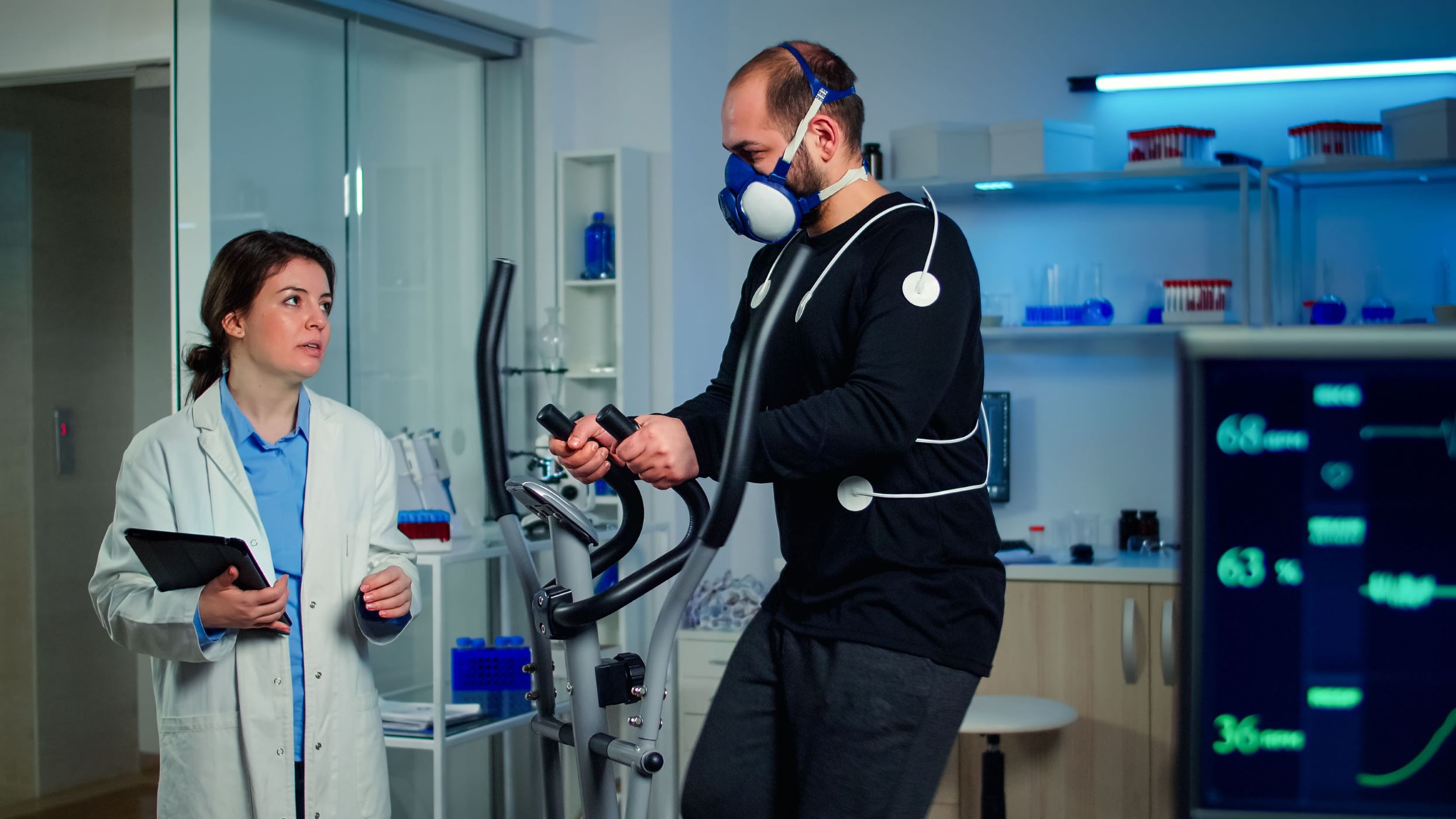Home>Misc>Featured>How Does Poop Affect Athletic Performance


Featured
How Does Poop Affect Athletic Performance
Modified: August 19, 2023
Learn how poop influences athletic performance and discover why it's a featured topic in optimizing sports training.
Introduction
When it comes to athletic performance, there are numerous factors that play a crucial role in determining an athlete’s success. From training regimens and skill development to mental focus and strategic planning, every aspect of an athlete’s routine contributes to their overall performance on the field, track, or court. However, one often overlooked aspect that can significantly impact athletic performance is digestion.
The process of digestion is essential for breaking down the food we consume, extracting nutrients, and providing energy to the body. It is the foundation upon which our bodies build endurance, strength, and stamina. Without proper digestion, athletes may experience a range of issues that can hinder their performance and progress.
In this article, we will explore the crucial role of digestion in athletic performance and how it can impact an athlete’s overall well-being. We will delve into the effects of gut health, hydration, electrolyte balance, and proper nutrition on athletic performance. Additionally, we will discuss common digestive issues that athletes may face and offer strategies to improve digestive health and optimize performance.
By understanding the significance of digestion and implementing effective strategies to support it, athletes can unlock their true potential and achieve peak performance levels.
The Role of Digestion in Athletic Performance
Digestion is a fundamental process that plays a vital role in athletic performance. It is responsible for breaking down the food we consume into smaller molecules that can be absorbed by the body and converted into energy. The efficient digestion and absorption of nutrients not only provide the necessary fuel for physical activity but also support muscle growth, tissue repair, and overall recovery.
When athletes engage in intense physical activity, their bodies require a substantial amount of energy to perform at their best. This energy comes from the nutrients found in food, including carbohydrates, proteins, and fats. Effective digestion ensures that these nutrients are properly broken down and absorbed, allowing the body to access the essential energy sources required for optimal athletic performance.
In addition to energy production, digestion also affects other aspects that are crucial for athletes, such as nutrient delivery and waste removal. Nutrients obtained through digestion are transported to various parts of the body, providing the necessary building blocks for muscle repair and growth. Moreover, the removal of waste products ensures that the body can maintain proper functioning and avoid potential disruptions that could hinder performance.
Furthermore, digestion plays a role in maintaining the body’s acid-base balance and pH levels. During exercise, the body produces lactic acid and other metabolic byproducts that can accumulate and lead to fatigue. Proper digestion helps regulate these levels, preventing the build-up of acid and allowing athletes to sustain high levels of performance for longer periods of time.
Overall, a well-functioning digestive system is essential for athletes to perform at their peak. It ensures the efficient breakdown and absorption of nutrients, supports energy production, facilitates the delivery of vital resources to muscles, and aids in waste removal. By prioritizing digestion and implementing strategies to optimize its function, athletes can enhance their overall athletic performance and achieve their goals.
Impact of Gut Health on Athletes
Gut health plays a significant role in an athlete’s overall well-being and athletic performance. The gut, also known as the gastrointestinal tract, is home to trillions of bacteria that make up the gut microbiota. These bacteria play a crucial role in digestion, nutrient absorption, immune function, and even mental health.
Research has shown that a healthy gut microbiota is essential for maintaining a strong immune system, which is particularly important for athletes. Intense exercise can temporarily suppress the immune system, making athletes more susceptible to infections and illnesses. However, a balanced and diverse gut microbiota can help boost immune function and reduce the risk of illness, allowing athletes to train and compete at their best.
Furthermore, the gut microbiota plays a crucial role in the digestion and absorption of nutrients. A well-balanced microbiota helps break down complex carbohydrates, fibers, and other compounds that are difficult for the body to digest on its own. This enables athletes to extract maximum nutrition from their food, ensuring they receive the necessary fuel and nutrients for optimal performance.
Additionally, gut health can directly impact an athlete’s mental well-being. The gut and the brain are connected through the gut-brain axis, a bidirectional communication system. The gut microbiota produces neurotransmitters and other chemicals that influence mood, stress response, and cognitive function. A healthy gut microbiota is associated with better mental health, improved focus, and reduced stress levels – all crucial factors for athletes aiming to excel in their chosen sport.
However, poor gut health can have detrimental effects on an athlete’s performance. Imbalances in the gut microbiota, such as a lack of beneficial bacteria or an overgrowth of harmful bacteria, can lead to digestive issues, nutrient deficiencies, and impaired immune function. These problems can result in decreased energy levels, slower recovery, and increased susceptibility to illness or injury.
It is important for athletes to prioritize their gut health by adopting habits that promote a diverse and balanced gut microbiota. This can be achieved through a nutrient-rich diet that includes plenty of fiber, fermented foods, and probiotics. Additionally, managing stress levels, getting enough sleep, and avoiding excessive use of antibiotics can also contribute to a healthy gut.
By taking care of their gut health, athletes can optimize their digestion, enhance nutrient absorption, support a strong immune system, and promote mental well-being. These factors ultimately contribute to improved athletic performance and overall well-being.
Effects of Hydration and Electrolyte Balance on Digestion and Performance
Proper hydration and electrolyte balance are crucial for optimal digestion and athletic performance. Water is essential for the smooth functioning of the digestive system, as it helps in the breakdown, absorption, and transportation of nutrients. It also supports the removal of waste products from the body.
When athletes engage in physical activity, they lose water through sweat, which can lead to dehydration if not adequately replenished. Dehydration can negatively impact digestion by reducing blood flow to the gastrointestinal tract, slowing down the movement of food through the intestines, and causing constipation. It can also impair the body’s ability to break down and absorb nutrients, leading to decreased energy levels and suboptimal athletic performance.
In addition to water, electrolytes such as sodium, potassium, and magnesium play a vital role in digestion and performance. These minerals help maintain proper fluid balance in the body and facilitate muscle contractions, including the contractions that move food through the digestive system. They also support nerve function and help regulate pH levels.
Electrolyte imbalances, such as low levels of sodium or potassium, due to excessive sweating or inadequate intake, can disrupt digestion and hinder athletic performance. These imbalances can lead to muscle cramps, fatigue, and even gastrointestinal distress, including nausea and vomiting.
Achieving and maintaining proper hydration and electrolyte balance is essential for athletes to optimize digestion and enhance athletic performance. Athletes should aim to drink sufficient fluids before, during, and after exercise to prevent dehydration. Fluid intake should be personalized based on factors such as body weight, sweat rate, and environmental conditions.
In terms of electrolyte balance, consuming sports drinks or electrolyte-enhanced beverages during prolonged or intense exercise can help replace the lost minerals. Including electrolyte-rich foods like bananas, oranges, and nuts in the diet can also contribute to maintaining a proper balance.
It is worth noting that overhydration, or hyponatremia, can also have adverse effects on digestion and performance. This occurs when athletes consume excessive amounts of fluids without sufficient electrolyte intake, diluting the body’s sodium levels. It can lead to nausea, bloating, and in severe cases, even brain swelling. Therefore, it is important for athletes to find a balance between adequate hydration and electrolyte intake.
By prioritizing hydration and ensuring electrolyte balance, athletes can support optimal digestion, enhance nutrient absorption, minimize gastrointestinal issues, and perform at their best.
Importance of Proper Nutrition for Athletic Performance
Proper nutrition is essential for athletes to achieve and maintain peak performance. The food we consume serves as the fuel for our bodies, providing the energy and nutrients necessary for optimal athletic performance, endurance, and recovery.
Carbohydrates are a primary source of energy for athletes, as they are broken down into glucose and stored as glycogen in the muscles and liver. Consuming an adequate amount of carbohydrates before exercise ensures that glycogen stores are replenished, allowing athletes to sustain high-intensity activities for longer periods of time. Additionally, carbohydrates aid in the efficient breakdown of fats and proteins, preventing them from being used as an energy source and preserving lean muscle mass.
Protein is another essential nutrient for athletes, as it plays a key role in muscle repair, growth, and recovery. Consuming an adequate amount of high-quality protein helps repair damaged muscle tissues, promotes muscle protein synthesis, and aids in the recovery process after intense exercise. Sources of lean protein include poultry, fish, tofu, lentils, and Greek yogurt.
Fats are also important for athletes as they provide a concentrated source of energy and aid in the absorption of fat-soluble vitamins. Healthy fats, such as those found in nuts, seeds, avocados, and oily fish, also possess anti-inflammatory properties and support overall cardiovascular health.
In addition to macronutrients, athletes must also focus on obtaining an adequate intake of micronutrients, including vitamins and minerals. These micronutrients are essential for various physiological processes, such as energy production, muscle contraction, and immune function. A deficiency in any of these micronutrients can have a negative impact on athletic performance and overall health.
Furthermore, proper nutrition plays a crucial role in injury prevention and recovery. Adequate intake of nutrients, such as vitamin C, vitamin E, zinc, and antioxidants, helps support the body’s immune system and aids in the repair of damaged tissues. Consuming a balanced diet that includes a variety of fruits, vegetables, whole grains, lean proteins, and healthy fats helps ensure athletes receive the necessary nutrients for optimal recovery and injury prevention.
Lastly, it is important for athletes to consider the timing and composition of their meals and snacks. Pre-exercise meals should consist of easily digestible carbohydrates and a moderate amount of protein to provide immediate energy and support muscle function. Post-exercise meals should focus on replenishing energy stores and promoting muscle recovery through the consumption of carbohydrates and protein.
Overall, proper nutrition is vital for athletes to support optimal athletic performance, enhance endurance, promote muscle growth and recovery, prevent injuries, and support overall health and well-being. By prioritizing proper nutrition and fueling their bodies with the right combination of macronutrients and micronutrients, athletes can reach their full potential and excel in their chosen sport.
Common Digestive Issues and their Impact on Athletes
Digestive issues can have a significant impact on an athlete’s performance and overall well-being. These issues can range from mild discomfort to severe gastrointestinal disorders, and they can affect athletes in various ways, both physically and mentally.
One common digestive issue that athletes may face is gastroesophageal reflux disease (GERD), also known as acid reflux. GERD occurs when stomach acid flows back into the esophagus, causing heartburn, chest pain, and regurgitation. This condition can be exacerbated by activities that involve bending over or high-impact movements and can severely impact an athlete’s comfort and performance.
Another digestive issue athletes may encounter is irritable bowel syndrome (IBS), a chronic condition that affects the large intestine, causing symptoms such as abdominal pain, bloating, and changes in bowel habits. IBS can be triggered by stress, certain foods, or intense exercise, and it can lead to discomfort and potentially impact an athlete’s ability to train and compete at their best.
Food intolerances and allergies are also prevalent among athletes and can significantly affect their digestive system. Intolerances to specific foods, such as lactose or gluten, can lead to symptoms like bloating, gas, diarrhea, or abdominal pain. Allergic reactions to certain foods can range from mild discomfort to severe symptoms like swelling, difficulty breathing, or hives. It is crucial for athletes to identify and manage any food intolerances or allergies to prevent digestive issues during training and competition.
Dealing with digestive issues can also have psychological effects on athletes. Constant discomfort, unpredictable bowel movements, or fear of having an episode during an event can cause anxiety, stress, and a decreased overall quality of life. These mental and emotional impacts can negatively influence an athlete’s focus, concentration, and confidence, ultimately affecting their performance on the field.
Furthermore, digestive issues can disrupt nutrient absorption and overall energy levels. Conditions like malabsorption, where the body has difficulty absorbing nutrients properly, can lead to nutrient deficiencies and decreased energy availability for physical activity. This can result in fatigue, reduced muscle strength, and a decline in overall athletic performance.
It is crucial for athletes to seek proper medical attention and guidance if they experience persistent digestive issues. A healthcare professional, such as a gastroenterologist or a sports nutritionist, can help identify the root cause of the problem and provide appropriate treatment and management strategies. These may include dietary modifications, stress management techniques, and targeted medications or supplements to alleviate symptoms and support optimal digestion.
Addressing and managing digestive issues is essential for athletes to ensure their comfort, well-being, and long-term performance. By taking proactive measures to identify and address these issues, athletes can optimize their digestive health and unlock their full potential in their chosen sport.
Strategies to Improve Digestive Health and Performance
For athletes, optimizing digestive health is crucial for enhancing performance, preventing discomfort, and promoting overall well-being. Fortunately, there are several strategies that can improve digestive health and support optimal athletic performance.
One of the most effective ways to improve digestive health is through a well-balanced and nutrient-rich diet. Incorporate a variety of fruits, vegetables, whole grains, lean proteins, and healthy fats into your meals. These foods provide an abundance of vitamins, minerals, fiber, and antioxidants that support proper digestion and overall gut health.
Furthermore, ensure adequate hydration by drinking sufficient amounts of water throughout the day. Hydration supports proper digestion and helps maintain regular bowel movements. Limit the consumption of sugary and carbonated beverages, as they can contribute to bloating, gas, and other gastrointestinal issues.
Probiotics, which are beneficial bacteria that promote a healthy gut microbiota, can also be beneficial for digestive health. Consider incorporating probiotic-rich foods such as yogurt, kefir, sauerkraut, and kimchi into your diet. Alternatively, you can opt for a high-quality probiotic supplement to help restore and maintain a healthy balance of gut bacteria.
Managing stress levels is also important for improving digestive health. Stress can negatively impact the digestive system and contribute to issues such as irritable bowel syndrome (IBS) and acid reflux. Engaging in stress-reducing activities such as meditation, yoga, deep breathing exercises, or regular physical activity can help alleviate stress and improve digestion.
Identifying and managing food intolerances or allergies is another key strategy for improving digestive health. If you suspect that a specific food is causing digestive issues, consider keeping a food diary or working with a healthcare professional to identify potential triggers and develop a suitable dietary plan that avoids those specific foods.
Incorporating regular exercise into your routine can also support healthy digestion. Physical activity stimulates the muscles in the digestive tract, promoting bowel movements and preventing constipation. Aim for a combination of cardiovascular exercises, strength training, and flexibility exercises to maintain overall fitness and support a healthy digestive system.
Avoiding excessive use of alcohol and tobacco is crucial for digestive health. Alcohol can irritate the gastrointestinal tract, leading to inflammation and disruptions in digestion. Smoking can contribute to issues such as acid reflux and increase the risk of developing gastrointestinal diseases.
Lastly, it is essential to listen to your body and pay attention to any signs or symptoms of digestive distress. If you experience persistent issues such as bloating, pain, or changes in bowel habits, consult with a healthcare professional. They can help identify the underlying cause and provide appropriate treatment or management strategies tailored to your needs.
By incorporating these strategies into your lifestyle, you can improve your digestive health, optimize nutrient absorption, minimize gastrointestinal issues, and enhance overall athletic performance.
Conclusion<\h2>
Digestion plays a vital role in athletic performance, impacting an athlete’s energy levels, nutrient absorption, immune function, and overall well-being. Prioritizing digestive health and implementing strategies to optimize it is essential for athletes to reach their full potential and excel in their chosen sport.
From the role of digestion in energy production to the impact of gut health on immune function and mental well-being, every aspect of an athlete’s digestive system can affect their performance. Issues such as acid reflux, irritable bowel syndrome (IBS), food intolerances, and even stress can disrupt digestion and hinder an athlete’s comfort and progress.
However, there are several strategies that athletes can implement to improve their digestive health. Prioritizing proper nutrition by consuming a well-balanced diet rich in carbohydrates, proteins, fats, and micronutrients is critical. Adequate hydration, probiotic-rich foods, stress management techniques, and regular exercise can also promote healthy digestion.
Identifying and managing digestive issues, such as food intolerances or allergies, is crucial in order to prevent discomfort and ensure optimal performance. Seeking guidance from healthcare professionals can help athletes uncover underlying causes and develop personalized strategies for managing their digestive health.
By prioritizing digestive health and implementing these strategies, athletes can optimize nutrient absorption, enhance energy levels, support a strong immune system, prevent injuries, and ultimately perform at their best.
Remember, each athlete is unique, and it may take time to find the right approach to improve digestive health. Patience, perseverance, and open communication with healthcare professionals are key in this journey.
By giving due attention to their digestion, athletes can unlock their full potential, achieve peak performance, and maintain the overall health and well-being necessary for long-term success in their sport.








